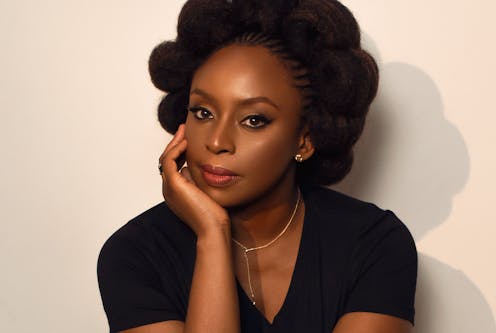in Dream Count, Chimamanda Ngozi Adichie explores love and loss
- Written by Frances Egan, Lecturer in the School of Languages, Literatures, Cultures and Linguistics, Monash University

When Chia is offered a book deal in the US, she thinks it’s for her “light, funny takes on travel”, but it turns out the publisher wants her to go to the Congo to write about violence against women.
Chia is a rich Nigerian immigrant, who freelances as a travel writer, and is interested in romance, restaurants, and “the comforting ordinariness” of people elsewhere. Devastated to be seen only through the lens of “struggle”, she tells her fiancé, Chuka, about the offer. “The problem is that many of these White people don’t think we also dream,” he replies.
In this moment, Chia feels seen by Chuka – she describes the “rapture of being known” – and used by the publisher, who does not care who she is.
Review: Dream Count – Chimamanda Ngozi Adichie (HarperCollins)
As is clear from the title, Chimamanda Ngozi Adichie’s latest novel is about dreams and desires. At the same time, it’s about inhabiting a global world shaped by the dominance of a particularly American imaginary, which seeks to determine who dreams, and about what, and whose inner being can possibly be known.
This is Adichie’s first full-length novel since the much loved and acclaimed Americanah (2013). Before Americanah, her Nigeria-Biafra war epic Half of a Yellow Sun (2006) won the Orange Prize for women’s fiction. She has since written feminist manifestos, essays, short stories and a children’s book.
She has two wildly influential TED talks: We should all be feminists (which featured in Beyoncé’s 2013 Flawless track); and The danger of a single story, used in classrooms around the world, including mine, for an accessible look at how power shapes storytelling
Dream Count is told through the eyes of four women, in interconnected but discrete parts. It moves between Nigeria, Guinea, America (and elsewhere), shifting perspective and place to reveal moralities that “circle and thin and change with circumstance”.
Along with the romantic Chiamaka (or Chia), who is the most “American”, there’s Chia’s cousin, the fearless Omelogor, (who quits banking to move to the US to do a masters degree in porn as an “educational tool”), her old friend Zikora, a corporate lawyer, pragmatic and traditional, and Kadiatou, the only working class and non-Nigerian voice. Kadiatou came to America from Guinea on an asylum claim, works as Chia’s housekeeper, and wants a good life for her daughter.
The novel begins and ends in Covid times, but feels like a sweeping saga, since the characters look back and reckon with what ifs. Adichie explains, in an author’s note, the book is really “about losing my mother”, and we get an unflinching look at loss and love and joy.
For many of the women, the reminiscing is about past loves, men who got away; for Kadiatou, there’s deeper loss. Ever the expert storyteller, Adichie works with gaps, re-evaluation, and a building sense of forewarning: Kadiatou thinks “she should have known something was wrong”.
Wanting without pretence
Dream Count is first and foremost about women looking for romantic love. And it by no means treats this pursuit as superficial (as pursuits deemed “feminine” frequently are). Instead, romantic love is understood to be fundamental to life, meaning, status, relationships with family and friends.
Adichie astutely and poetically renders the difficult gender dynamics that can sometimes define heterosexual relationships and desires, especially in a world where post-feminist expectations about gender equality and individual agency create disconnects between what women feel, tell themselves, and tell others. Such as:
Don’t be needy.
For a while, Chia dates a stereotypically reasonable and casual man, with an intellectual take on emotion. Darnell, an African American academic, finds Chia’s neediness “boring” and squashes her pleasures. “Whenever I laid intimacies before him,” Chia explains, “he responded in detached tones, or with a breezy mockery that stung”. Chia softens the worst parts about him to her friends, and to herself, only saying in hindsight: “Do we need another name” – not love – “for this state of queasy dysphoria?”
Don’t desire marriage.
Where Chia wants “incandescent love”, Zikora wants stability and children, and is happy to admit that “her truest longing, for marriage, depended on someone else”. Still, Zikora gets a hard time for being insufficiently happy on her own.
Do get married though. Or at least have children!
Child-free in her forties, full of self-love (where self means African and community love too), and developing intimacy with a woman, Omelogor is suspected of pretence. A call from a nosy aunt comes with unsolicited information on adoption centres and cutting advice: “Don’t pretend that you like the life you’re living”.
The novel maps out the cultural norms and social structures that inform individual possibilities and desires, and the pressure to deny they are there. At the same time, it shows the impact of too much pretending. It is heartbreaking, for example, when Zikora sees beneath her mother’s cold exterior and learns what she lived with in return for respect.
While Dream Count sometimes goes over well-trodden ground in its depiction of individual relationships and binary dynamics, it’s full of highlightable lines and funny quips, and the wider web of voices keeps it fresh. As the narrative voice changes, and a friend/cousin/housekeeper becomes storyteller, the layers seem to hold the answers to love and knowing.
More than a victim
When Chia is reflecting on her relationship with Darnell, the feisty Omelogor says: “You’re allowed to be victim and something else, not just victim.” Dream Count does not victim blame, but neither does it let its characters be seen through a homogenous and solely subordinated femininity.
Enter Kadiatou. Kadi’s character is inspired by Nafissatou Diallo, the Guinean immigrant working as a cleaner in a prestigious New York City hotel, who accused Dominique Strauss-Kahn, then the head of the International Monetary Fund, of sexually assaulting her in 2011. (A criminal case against Strauss-Kahn, who was indicted on charges including attempted rape and sexual abuse, was dropped in August 2011 when questions arose about Diallo’s credibility. Diallo also filed a civil case against him, reaching a confidential settlement.) Adichie wrote about the case later that same year, and the way Diallo was depicted in the press as a liar and prostitute.
Dream Count fictionalises the assault and aftermath. Kadi is similarly stereotyped in the media – there are “mournful articles listing the dreams” the accused will lose – but is a subject, with a full backstory, in Adichie’s novel.
In her author’s note, Adichie says she wanted to write a curious and human portrait not an ideological one, saying “ideology blocks different ways of seeing and art requires many eyes”. While Kadi seems almost too good, the perfect docile immigrant, we can forgive Adichie this, in what she describes as an effort to “‘write’ a wrong in the balance of stories”.


















